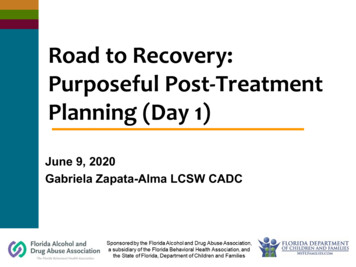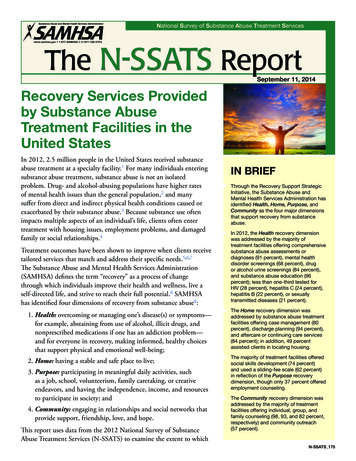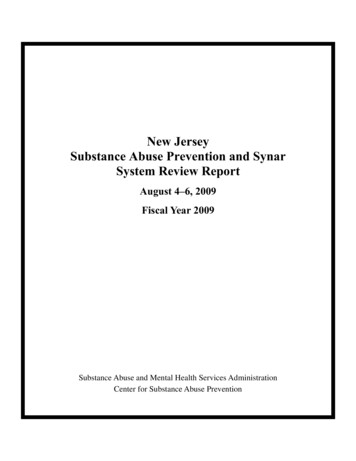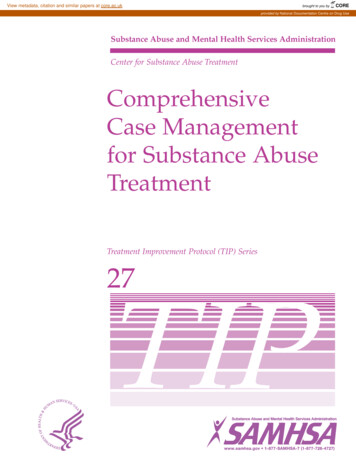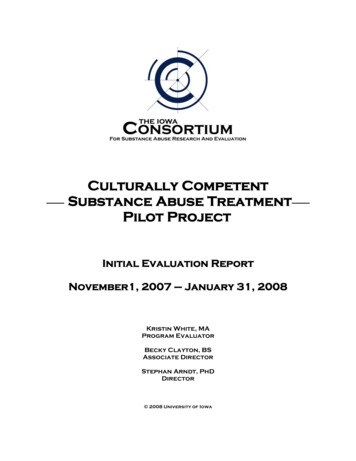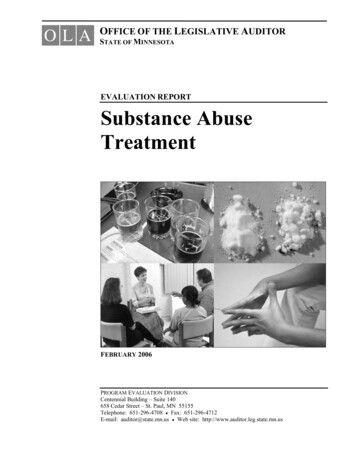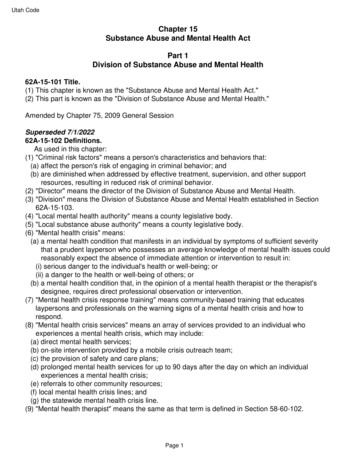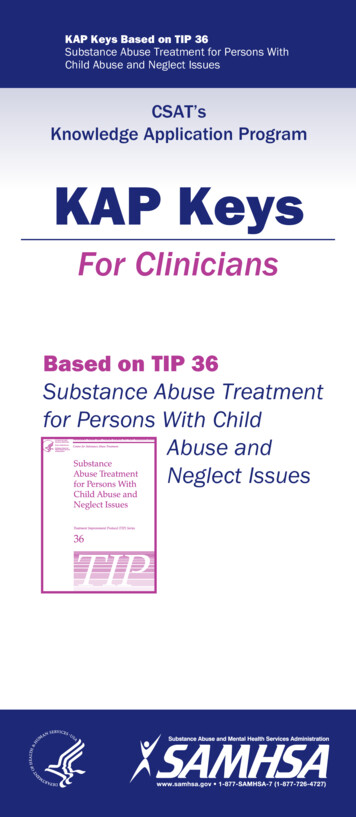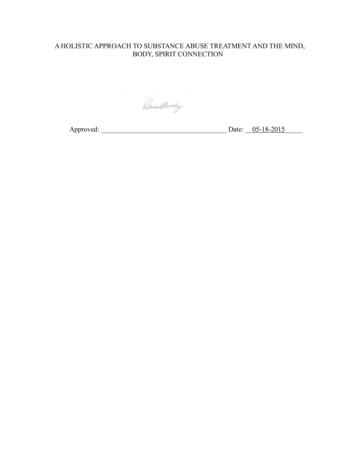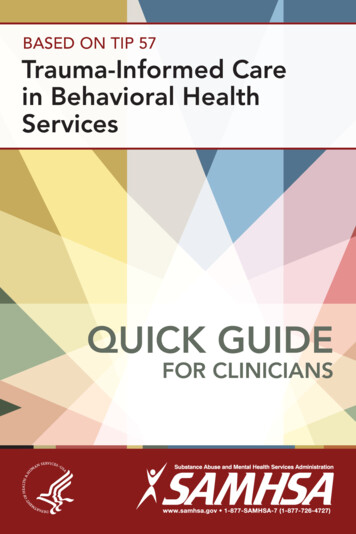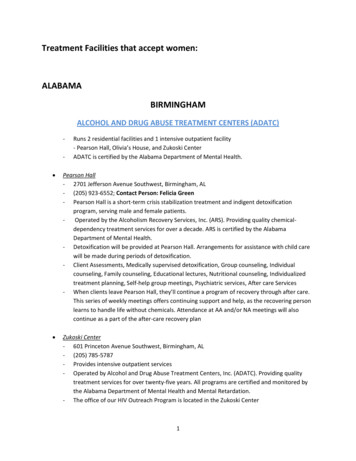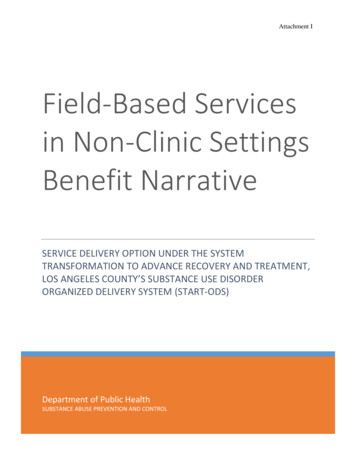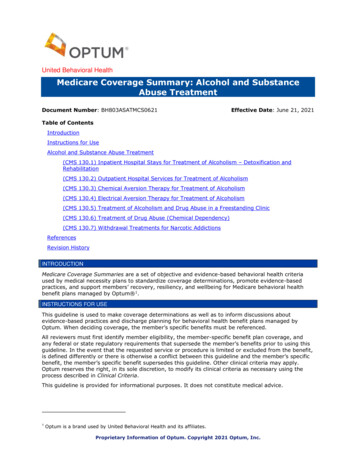
Transcription
United Behavioral HealthMedicare Coverage Summary: Alcohol and SubstanceAbuse TreatmentDocument Number: BH803ASATMCS0621Effective Date: June 21, 2021Table of ContentsIntroductionInstructions for UseAlcohol and Substance Abuse Treatment(CMS 130.1) Inpatient Hospital Stays for Treatment of Alcoholism – Detoxification andRehabilitation(CMS 130.2) Outpatient Hospital Services for Treatment of Alcoholism(CMS 130.3) Chemical Aversion Therapy for Treatment of Alcoholism(CMS 130.4) Electrical Aversion Therapy for Treatment of Alcoholism(CMS 130.5) Treatment of Alcoholism and Drug Abuse in a Freestanding Clinic(CMS 130.6) Treatment of Drug Abuse (Chemical Dependency)(CMS 130.7) Withdrawal Treatments for Narcotic AddictionsReferencesRevision HistoryMedicare Coverage Summaries are a set of objective and evidence-based behavioral health criteriaused by medical necessity plans to standardize coverage determinations, promote evidence-basedpractices, and support members’ recovery, resiliency, and wellbeing for Medicare behavioral healthbenefit plans managed by Optum 1.This guideline is used to make coverage determinations as well as to inform discussions aboutevidence-based practices and discharge planning for behavioral health benefit plans managed byOptum. When deciding coverage, the member’s specific benefits must be referenced.All reviewers must first identify member eligibility, the member-specific benefit plan coverage, andany federal or state regulatory requirements that supersede the member’s benefits prior to using thisguideline. In the event that the requested service or procedure is limited or excluded from the benefit,is defined differently or there is otherwise a conflict between this guideline and the member’s specificbenefit, the member’s specific benefit supersedes this guideline. Other clinical criteria may apply.Optum reserves the right, in its sole discretion, to modify its clinical criteria as necessary using theprocess described in Clinical Criteria.This guideline is provided for informational purposes. It does not constitute medical advice.Optum is a brand used by United Behavioral Health and its affiliates.Proprietary Information of Optum. Copyright 2021 Optum, Inc.
Optum may also use tools developed by third parties that are intended to be used in connection withthe independent professional medical judgment of a qualified health care provider and do notconstitute the practice of medicine or medical advice.Optum may develop clinical criteria or adopt externally-developed clinical criteria that supersede thisguideline when required to do so by contract or regulation.This Medicare Coverage Summary is based on the following CMS National Coverage Determinations(NCDs), and is applicable to all states. (CMS 130.1) Inpatient Hospital Stays for Treatment of Alcoholism – Detoxification andRehabilitation (CMS 130.2) Outpatient Hospital Services for Treatment of Alcoholism (CMS 130.3) Chemical Aversion Therapy for Treatment of Alcoholism (CMS 130.4) Electrical Aversion Therapy for Treatment of Alcoholism (CMS 130.5) Treatment of Alcoholism and Drug Abuse in a Freestanding Clinic (CMS 130.6) Treatment of Drug Abuse (Chemical Dependency) (CMS 130.7) Withdrawal Treatments for Narcotic Addictions*For Substance-Related covered services not addressed by these NCDs, please apply the ASAMCriteria. *For services not fully addressed by these NCDs, please apply the ASAM Criteria inconjunction with applicable NCDs.Indications (CMS 130.1 Inpatient Hospital Stays for Treatment of Alcoholism –Detoxification and Rehabilitation)A. Inpatient Hospital Stay for Alcohol DetoxificationMany hospitals provide detoxification services during the more acute stages of alcoholism or alcoholwithdrawal. When the high probability or occurrence of medical complications (e.g., delirium,confusion, trauma, or unconsciousness) during detoxification for acute alcoholism or alcoholwithdrawal necessitates the constant availability of physicians and/or complex medical equipmentfound only in the hospital setting, inpatient hospital care during this period is considered reasonableand necessary and is therefore covered under the program. Generally, detoxification can beaccomplished within two to three days with an occasional need for up to five days where the patient’scondition dictates. This limit (five days) may be extended in an individual case where there is a needfor a longer period for detoxification for a particular patient.In such cases, however, there should be documentation by a physician which substantiates that alonger period of detoxification was reasonable and necessary. When the detoxification needs of anindividual no longer require an inpatient hospital setting, coverage should be denied on the basis thatinpatient hospital care is not reasonable and necessary as required by §1862(a)(l) of the SocialSecurity Act (the Act). Following detoxification, a patient may be transferred to an inpatientrehabilitation unit or discharged to a residential treatment program or outpatient treatment setting.B. Inpatient Hospital Stay for Alcohol RehabilitationHospitals may also provide structured inpatient alcohol rehabilitation programs to the chronic alcoholic.These programs are composed primarily of coordinated educational and psychotherapeutic servicesprovided on a group basis. Depending on the subject matter, a series of lectures, discussions, films,and group therapy sessions are led by either physicians, psychologists, or alcoholism counselors fromthe hospital or various outside organizations. In addition, individual psychotherapy, and familycounseling (see §70.1) may be provided in selected cases. These programs are conducted under thesupervision and direction of a physician. Patients may directly enter an inpatient hospital rehabilitationprogram after having undergone detoxification in the same hospital or in another hospital or mayenter an inpatient hospital rehabilitation program without prior hospitalization for detoxification.Page 2 of 10
Alcohol rehabilitation can be provided in a variety of settings other than the hospital setting. In orderfor an inpatient hospital stay for alcohol rehabilitation to be covered under Medicare it must bemedically necessary for the care to be provided in the inpatient hospital setting rather than in a lesscostly facility or on an outpatient basis. Inpatient hospital care for receipt of an alcohol rehabilitationprogram would generally be medically necessary where either (l) there is documentation by thephysician that recent alcohol rehabilitation services in a less intensive setting or on an outpatient basishave proven unsuccessful and, as a consequence, the patient requires the supervision and intensity ofservices which can only be found in the controlled environment of the hospital, or (2) only the hospitalenvironment can assure the medical management or control of the patient’s concomitant conditionsduring the course of alcohol rehabilitation. (However, a patient’s concomitant condition may make theuse of certain alcohol treatment modalities medically inappropriate.)In addition, the “active treatment”2 criteria (see the Medicare Benefit Policy Manual, Chapter 2,“Inpatient Psychiatric Hospital Services,” §20) should be applied to psychiatric care in the generalhospital as well as to psychiatric care in a psychiatric hospital. Since alcoholism is classifiable as apsychiatric condition the “active treatment” criteria must also be met in order for alcohol rehabilitationservices to be covered under Medicare. (Thus, it is the combined need for “active treatment” and forcovered care which can only be provided in the inpatient hospital setting, rather than the fact thatrehabilitation immediately follows a period of detoxification which provides the basis for coverage ofinpatient hospital alcohol rehabilitation programs.)Generally, 16-19 days of rehabilitation services are sufficient to bring a patient to a point where carecould be continued in other than an inpatient hospital setting. An inpatient hospital stay for alcoholrehabilitation may be extended beyond this limit in an individual case where a longer period of alcoholrehabilitation is medically necessary. In such cases, however, there should be documentation by aphysician which substantiates the need for such care. Where the rehabilitation needs of an individualno longer require an inpatient hospital setting, coverage should be denied on the basis that inpatienthospital care is not reasonable and necessary as required by §1862 (a)(l) of the Act.Subsequent admissions to the inpatient hospital setting for alcohol rehabilitation follow-up,reinforcement, or “recap” treatments are considered to be readmissions (rather than an extension ofthe original stay) and must meet the requirements of this section for coverage under Medicare. Prioradmissions to the inpatient hospital setting - either in the same hospital or in a different hospital may be an indication that the “active treatment” requirements are not met (i.e., there is noreasonable expectation of improvement) and the stay should not be covered. Accordingly, thereshould be documentation to establish that “readmission” to the hospital setting for alcoholrehabilitation services can reasonably be expected to result in improvement of the patient’s condition.For example, the documentation should indicate what changes in the patient’s medical condition,social or emotional status, or treatment plan make improvement likely, or why the patient’s initialhospital treatment was not sufficient.C. Combined Alcohol Detoxification/Rehabilitation ProgramsMedicare Administrative Contractors (MACs) should apply the guidelines in A. and B. above to bothphases of a combined inpatient hospital alcohol detoxification/rehabilitation program. Not all patientswho require the inpatient hospital setting for detoxification also need the inpatient hospital setting forrehabilitation. (See §130.1 for coverage of outpatient hospital alcohol rehabilitation services.) Wherethe inpatient hospital setting is medically necessary for both alcohol detoxification and rehabilitation,generally a 3-week period is reasonable and necessary to bring the patient to the point where carecan be continued in other than an inpatient hospital setting.Per the Medicare Benefit Policy Manual, Chapter 2, Section 30.2.2.1, for services to be designated as activetreatment, they must be: 1) provided under an individualized treatment or diagnostic plan (2) reasonably expectedto improve the patient's condition or for the purpose of diagnosis; and (3) supervised and evaluated by a physician.Page 3 of 10
Decisions regarding reasonableness and necessity of treatment, the need for an inpatient hospitallevel of care, and length of treatment should be made by A/MACs based on accepted medical practicewith the advice of their medical consultant.3 (In hospitals under PSRO review, PSRO determinations ofmedical necessity of services and appropriateness of the level of care at which services are providedare binding on A/MACs for purposes of adjudicating claims for payment.)Indications (CMS 130.2 Outpatient Hospital Services for Treatment of Alcoholism)Coverage of outpatient hosptial services for treatment of alcoholism is available for both diagnosticand therapeutic services furnished for the treatment of alcoholism by the hospital to outpatientssubject to the same rules applicable to hospital outpatient services in general. While there is nocoverage for day hospitalization programs, per se, individual services which meet the requirements inthe Medicare Benefit Policy Manual, Chapter 6, §20 may be covered. Meals, transportation andrecreational and social activities do not fall within the scope of covered outpatient hospital servicesunder Medicare.All services must be reasonable and necessary for diagnosis and treatment of the patient’s conditionMedicare Benefit Policy Manual, Chapter 6, §20. Thus educational services and family counselingwould only be covered where they are directly related to treatment of the patient’s condition. Thefrequency of treatment and period of time over which it occurs must also be reasonable and necessary.Indications (CMS 130.3 Chemical Aversion Therapy for Treatment of Alcoholism)Available evidence indicates that chemical aversion therapy may be an effective component of certainalcoholism treatment programs, particularly as part of multi-modality treatment programs whichinclude other behavioral techniques and therapies, such as psychotherapy. Based on this evidencechemical aversion therapy is covered under Medicare. However, since chemical aversion therapy is ademanding therapy which may not be appropriate for all Medicare beneficiaries needing treatment foralcoholism, a physician should certify to the appropriateness of chemical aversion therapy in theindividual case. Therefore, if chemical aversion therapy for treatment of alcoholism is determined tobe reasonable and necessary for an individual patient, it is covered under Medicare.When it is medically necessary for a patient to receive chemical aversion therapy as a hospitalinpatient, coverage for care in that setting is available (See §130.1 regarding coverage of multimodality treatment programs). Follow-up treatments for chemical aversion therapy can generally beprovided on an outpatient basis. Thus, where a patient is admitted as an inpatient for receipt ofchemical aversion therapy, there must be documentation by the physician of the need in the individualcase for the inpatient hospital admission.Decisions regarding reasonableness and necessity of treatment, the need for an inpatient hospitallevel of care, and length of treatment should be made by A/MACs based on accepted medical practicewith the advice of their medical consultant.4 (In hospitals under Quality Improvement Organization(QIO) review, QIO determinations of medical necessity of services and appropriateness of the level ofcare at which services are provided are binding on A/MACs for purposes of adjudicating claims forpayment).Indications (CMS 130.4 Electrical Aversion Therapy for Treatment of Alcoholism)Electrical aversion therapy has not been shown to be safe and effective and therefore is excluded fromcoverage.See the Medicare Coverage Summary, Psychiatric Inpatient Hospitalization for guidanceSee the Medicare Coverage Summary, Psychiatric Inpatient Hospitalization for guidancePage 4 of 10
Indications (CMS 130.5 Treatment of Alcoholism and Drug Abuse in a Freestanding Clinic)Coverage is available for alcholism or drug abuse treatment services (such as drug therapy,psychotherapy, and patient education) that are provided incident to a physician’s5 professionalservice in a freestanding clinic to patients who, for example, have been discharged from an inpatienthospital stay for the treatment of alcoholism or drug abuse or to individuals who are not in the acutestages of alcoholism or drug abuse but require treatment. Services must also be reasonable andnecessary for the diagnosis or treatment of the individual’s alcoholism or drug abuse. The Part Bpsychiatric limitation would apply to alcoholism or drug abuse treatment services furnished byphysicians to individuals who are not hospital inpatients.Indications (CMS 130.6 Treatment of Drug Abuse (Chemical Dependency))It is recognized that there are similarities between the approach to treatment of drug abuse andalcohol detoxification and rehabilitation. However, the intensity and duration of treatment for drugabuse may vary (depending on the particular substance(s) of abuse, duration of use, and the patient’smedical and emotional condition) from the duration of treatment or intensity needed to treatalcoholism.When it is medically necessary for a patient to receive detoxification and/or rehabilitation for drugsubstance abuse as a hospital inpatient, coverage for care in that setting is available. Coverage is alsoavailable for treatment services that are provided in the outpatient department of a hospital topatients who, for example, have been discharged from an inpatient stay for the treatment of drugsubstance abuse or who require treatment but do not require the availability and intensity of servicesfound only in the inpatient hospital setting. The coverage available for these services is subject to thesame rules generally applicable to the coverage of outpatient hospital services. (See the MedicareBenefit Policy Manual (BPM), Chapter 6, “Hospital Services Covered Under Part B,” §§20.)The servicesmust also be reasonable and necessary for treatment of the individual’s condition. (See the MedicareBPM, Chapter 16, “General Exclusions from Coverage,” §90.)Decisions regarding reasonableness and necessity of treatment, the need for an inpatient hospitallevel of care, and length of treatment should be made by A/MACs based on accepted medical practicewith the advice of their medical consultant.6 (In hospitals under Quality Improvement Organization(QIO) review, QIO determinations of medical necessity of services and appropriateness of the level ofcare at which services are provided are binding on A/B MACs for purposes of adjudicating claims forpayment.)Indications (CMS 130.7 Withdrawal Treatments for Narcotic Addictions)Withdrawal is an accepted treatment for narcotic addiction and payment can be made for theseservices if they are provided by the physician directly or under the physician’s personal supervisionand if they are reasonable and necessary. In reviewing claims, reasonableness and necessity aredetermined with the aid of the B/Medicare Administrative Contractor’s medical staff.Drugs that the physician provides in connection with this treatment are also covered if they cannot beself-administered and meet all other statutory requirements.Per the Medicare Benefit Policy Manual, Chapter 15, Section 60, physician means physician or other practitioner(physician, physician assistant, nurse practitioner, clinical nurse specialist, nurse midwife, and clinical psychologist)authorized by the Act to receive payment for services incident to his or her own services.See the Medicare Coverage Summaries, Psychiatric Inpatient Hospitalization, Psychiatric Partial Hospitalization,and Outpatient Psychiatric and Psychological Services for guidance.Page 5 of 10
Medicare Benefit Policy ManualFor Partial Hospitalization Substance Use Disorders please see the Optum Medicare CoverageSummary: Psychiatric Partial Hospitalization, in addition to the CMS Medicare Benefit Policy Manualinformation (see below): Medicare Benefit Policy Manual Chapter 6 - Hospital Services Covered UnderPart B, section 70.3 Partial Hospitalization Services: Partial hospitalization programs (PHPs) are structured to provide intensive psychiatric carethrough active treatment that utilizes a combination of the clinically recognized items andservices described in §1861(ff) of the Social Security Act (the Act). The treatment program ofa PHP closely resembles that of a highly structured, short-term hospital inpatient program. Itis treatment at a level more intense than outpatient day treatment or psychosocialrehabilitation. Programs providing primarily social, recreational, or diversionary activities arenot considered partial hospitalization.ooProgram Criteria PHPs work best as part of a community continuum of mental health serviceswhich range from the most restrictive inpatient hospital setting to lessrestrictive outpatient care and support. Program objectives should focus onensuring important community ties and closely resemble the real-lifeexperiences of the patients served. PHPs may be covered under Medicarewhen they are provided by a hospital outpatient department or a Medicarecertified CMHC. Partial hospitalization is active treatment that incorporates an individualizedtreatment plan which describes a coordination of services wrapped around theparticular needs of the patient, and includes a multidisciplinary team approachto patient care under the direction of a physician. The program reflects a highdegree of structure and scheduling. According to current practice guidelines,the treatment goals should be measurable, functional, time-framed, medicallynecessary, and directly related to the reason for admission. A program comprised primarily of diversionary activity, social, or recreationaltherapy does not constitute a PHP. Psychosocial programs which provide onlya structured environment, socialization, and/or vocational rehabilitation arenot covered by Medicare. A program that only monitors the management ofmedication for patients whose psychiatric condition is otherwise stable, is notthe combination, structure, and intensity of services which make up activetreatment in a PHP.Patient Eligibility Criteria Patients must meet benefit requirements for receiving the partialhospitalization services as defined in §1861(ff) and §1835(a)(2)(F) of the Act.Patients admitted to a PHP must be under the care of a physician who certifiesthe need for partial hospitalization and require a minimum of 20 hours perweek of therapeutic services, as evidenced by their plan of care. The patientsalso require a comprehensive, structured, multimodal treatment requiringmedical supervision and coordination, provided under an individualized plan ofcare, because of a mental disorder which severely interferes with multipleareas of daily life, including social, vocational, and/or educational functioning.Such dysfunction generally is of an acute nature. In addition, PHP patientsmust be able to participate in the active treatment process cognitively andemotionally, and be capable of tolerating the intensity of a PHP program.Page 6 of 10
o Patients meeting benefit category requirements for Medicare coverage of aPHP comprise two groups: those patients who are discharged from an inpatienthospital treatment program, and the PHP is in lieu of continued inpatienttreatment; or those patients who, in the absence of partial hospitalization,would be at reasonable risk of requiring inpatient hospitalization. Where partialhospitalization is used to shorten an inpatient stay and transition the patient toa less intense level of care, there must be evidence of the need for the acute,intense, structured combination of services provided by a PHP. Recertificationmust address the continuing serious nature of the patients’ psychiatriccondition requiring active treatment in a PHP. Discharge planning from a PHP may reflect the types of best practicesrecognized by professional and advocacy organizations that ensurecoordination of needed services and follow-up care. These activities includelinkages with community resources, supports, and providers in order topromote a patient’s return to a higher level of functioning in the leastrestrictive environment. Covered Services Items and services that can be included as part of the structured, multimodalactive treatment program include: Individual or group psychotherapy with physicians, psychologists, orother mental health professionals authorized or licensed by the Statein which they practice (e.g., licensed clinical social workers, clinicalnurse specialists, certified alcohol and drug counselors); Occupational therapy requiring the skills of a qualified occupationaltherapist. Occupational therapy, if required, must be a component ofthe physician’s treatment plan for the individual; Services of other staff (social workers, psychiatric nurses, and others)trained to work with psychiatric patients; Drugs and biologicals that cannot be self-administered and arefurnished for therapeutic purposes (subject to limitations specified in42 CFR 410.29); Individualized activity therapies that are not primarily recreational ordiversionary. These activities must be individualized and essential forthe treatment of the patient’s diagnosed condition and for progresstoward treatment goals; Family counseling services for which the primary purpose is thetreatment of the patient’s condition; Patient training and education, to the extent the training andeducational activities are closely and clearly related to the individualscare and treatment of his/her diagnosed psychiatric condition; and Medically necessary diagnostic services related to mental healthtreatment.Partial hospitalization services that make up a program of active treatment mustbe vigorous and proactive (as evidenced in the individual treatment plan andprogress notes) as opposed to passive and custodial. It is not enough that apatient qualify under the benefit category requirements in or of §1835(a)(2)(F)unless he/she also has the need for the active treatment provided by the programof services defined in §1861(ff). It is the need for intensive, active treatment ofhis/her condition to maintain a functional level and to prevent relapse orhospitalization, which qualifies the patient to receive the services identified in§1861(ff).Reasonable and Necessary ServicesPage 7 of 10
oThis program of services provides for the diagnosis and active, intensive treatment ofthe individual’s serious psychiatric condition and, in combination, are reasonablyexpected to improve or maintain the individual’s condition and functional level andprevent relapse or hospitalization. A particular individual covered service (describedabove) as intervention, expected to maintain or improve the individual’s condition andprevent relapse, may also be included within the plan of care, but the overall intent ofthe partial program admission is to treat the serious presenting psychiatric symptoms.Continued treatment in order to maintain a stable psychiatric condition or functionallevel requires evidence that less intensive treatment options (e.g., intensive outpatient,psychosocial, day treatment, and/or other community supports) cannot provide thelevel of support necessary to maintain the patient and to prevent hospitalization.oPatients admitted to a PHP do not require 24 hour per day supervision as provided inan inpatient setting, must have an adequate support system to sustain/maintainthemselves outside the PHP and must not be an imminent danger to themselves orothers. Patients admitted to a PHP generally have an acute onset or decompensationof a covered Axis I mental disorder, as defined by the current edition of the Diagnosticand Statistical Manual published by the American Psychiatric Association or listed inChapter 5, of the version of the International Classification of Diseases (ICD)applicable to the service date, which severely interferes with multiple areas of daily life.The degree of impairment will be severe enough to require a multidisciplinaryintensive, structured program, but not so limiting that patients cannot benefit fromparticipating in an active treatment program. It is the need, as certified by the treatingphysician, for the intensive, structured combination of services provided by theprogram that constitute active treatment, that are necessary to appropriately treat thepatient’s presenting psychiatric condition.oFor patients who do not meet this degree of severity of illness, and for whom partialhospitalization services are not necessary for the treatment of a psychiatric condition,professional services billed to Medicare Part B (e.g., services of psychiatrists andpsychologists) may be medically necessary, even though partial hospitalizationservices are not.oPatients in PHP may be discharged by either stepping up to an inpatient level of carewhich would be required for patients needing 24-hour supervision, or stepping down toa less intensive level of outpatient care when the patient’s clinical condition improvesor stabilizes, and he/she no longer requires structured, intensive, multimodaltreatment.Reasons for DenialooBenefit category denials made under §1861(ff) or §1835(a)(2)(F) are not appealableby the provider and the limitation on liability provision does not apply (HCFA Ruling97-1). Examples of benefit category based in §1861(ff) or §1835(a)(2)(F) of the Act,for partial hospitalization services generally include the following: Day care programs, which provide primarily social, recreational, ordiversionary activities, custodial or respite care; Programs attempting to maintain psychiatric wellness, where there is no riskof relapse or hospitalization, e.g., day care programs for the chronicallymentally ill; or Patients who are otherwise psychiatrically stable or require medicationmanagement only.Coverage denials made under §1861(ff) of the Act are not appealable by the providerand the Limitation on Liability provision does not apply (HCFA Ruling 97-1). Thefollowing services are excluded from the scope of partial hospitalization servicesdefined in §1861(ff) of the Social Security Act: Services to hospital inpatients; Meals, self-administered medications, transportation; andPage 8 of 10
o Vocational training.Reasonable and necessary denials based on §1862(a)(1)(A) are appealable and theLimitation on Liability provision does apply. The following examples representreasonable and necessary denials for partial hospitalization services and coverage isexcluded under §1862(a)(1)(A) of the Social Security Act: Patients who cannot, or refuse, to participate (due to their behavioral orcognitive status) with active treatment of their mental disorder (except for abrief admission necessary for diagnostic purposes), or who cannot tolerate theintensity of a PHP; or Treatment of chronic conditions without acute exacerbation of symptoms thatplace the individual at risk of relapse or hospitalization.Documentation Requirements and Physician SupervisionoInitial Psychiatric Evaluation/Certification--Upon admission, a certification by thephysician must be made that the patient admitted to the PHP would require inpatientpsychiatric hospitalization if the partial hospitalization services were not provided. Thecertification should identify the diagnosis and psychiatric need for the partialhospitalization. Partial hospitalization servi
(CMS 130.3) Chemical Aversion Therapy for Treatment of Alcoholism (CMS 130.4) Electrical Aversion Therapy for Treatment of Alcoholism (CMS 130.5) Treatment of Alcoholism and Drug Abuse in a Freestanding Clinic (CMS 130.6) Treatment of Drug Abuse (Chemical Dependency) (CMS 130.7) Withdrawal Treatments for Narcotic Addictions References
